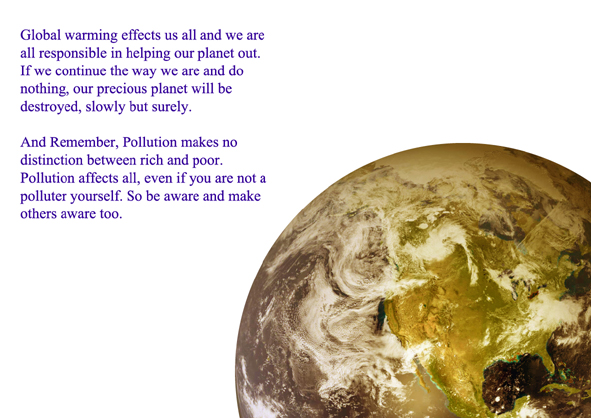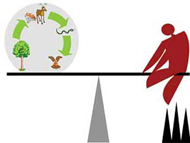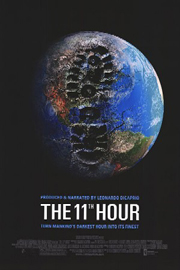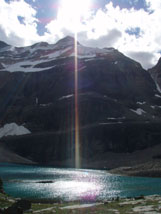
We have only one PLANET and one FUTURE!
|
ALL THINGS ARE CONNECTED…. |
Today the most grave challenge before the mankind is to live in harmony with nature. The speech of Chief Seattle was famous. The speech was given somewhere back in 19th century, when European settlers started exploiting the natural resources of north America, and proposed to purchase the land where Red Indians were living. In response to the same, the Chief Seattle (on behalf of Red Indians) gave the following speech. What a great example of love and respect for nature! |
How can you buy or sell the sky, the warmth of the land? The idea is strange to us. If we do not own the freshness of the air and the sparkle of the water, how can you buy them? Every part of this earth is sacred to my people. Every shining pine needle, every sandy shore, every mist in the dark woods, every clearing and humming insect is holy in the memory and experience of my people. The sap which courses through the trees carries the memories of the red man. The white man's dead forget the country of their birth when they go to walk among the stars. Our dead never forget this beautiful earth, for it is the mother of the red man. We are part of the earth and it is part of us. The perfumed flowers are our sisters; the deer, the horse, the great eagle, these are our brothers. The rocky crests, the juices in the meadows, the body heat of the pony, and man --- all belong to the same family. We will consider your offer to buy our land. But it will not be easy. For this land is sacred to us. This shining water that moves in the streams and rivers is not just water but the blood of our ancestors. If we sell you the land, you must remember that it is sacred, |
and you must teach your children that it is sacred and that each ghostly reflection in the clear water of the lakes tells of events and memories in the life of my people. The water's murmur is the voice of my father's father. The rivers are our brothers, they quench our thirst. The rivers carry our canoes, and feed our children. If we sell you our land, you must remember,
and teach your children, that the rivers are our brothers and yours, and you must henceforth give the rivers the kindness you would give any brother. The air is precious to the red man for all things share the same breath, the beast, the tree, the man, they all share the same breath. The white |
man does not seem to notice the air he breathes. Like a man dying for many days he is numb to the stench. But if we sell you our land, you must remember that the air is precious to us, that the air shares its spirit with all the life it supports. The wind that gave our grandfather his first breath also receives his last sigh. And if we sell you our land, you must keep it apart and sacred as a place where even the white man can go to taste the wind that is sweetened by the meadow's flowers. You must teach your children that the ground beneath their feet is the ashes of our grandfathers. So that they will respect the land, tell your children that the earth is rich with the lives of our kin. Teach your children that we have taught our children that the earth is our mother. Whatever befalls the earth befalls the sons of earth. If men spit upon the ground, they spit upon themselves. This we know; the earth does not belong to man; man belongs to the earth. This we know. All things are connected. Whatever befalls the Earth, befalls the sons of the Earth. Man did not weave the web of life. He is merely a strand in it. Whatever he does to the web, he does to himself. |
|
||
Your Planet Needs YOU-
Say what will you offer to your Planet? |
||
Human beings and the environment go hand in hand. The environment around us directly impacts our health and lifestyle and our varied actions - the fuel we use, the forests we cut down, the plastic matter we scatter around - on land and in water bodies - degrades the environment and consequently, in turn, means poor quality drinking water, soil erosion, more diseases and disasters... In simple words, it means unhealthy living conditions for us. So it's a circle that we live in - the circle of life. And we must, therefore, ensure that if we strive to enrich and protect the environment, it actually means that we are ensuring a healthier and more profitable lifestyle for ourselves. This year, the theme for World Environment Day 2009 is ‘Your Planet Needs You-UNite to Combat Climate Change’. In our own ways, we can do small little things which we will coalesce into a huge change in environment around the world, each day. One environment saving measure by one individual each day will mean the entire planet Earth pulling in a healthy gulp of breath daily, which means that I as an individual wear the crown for nourishing the earth. Big credit this! |
||
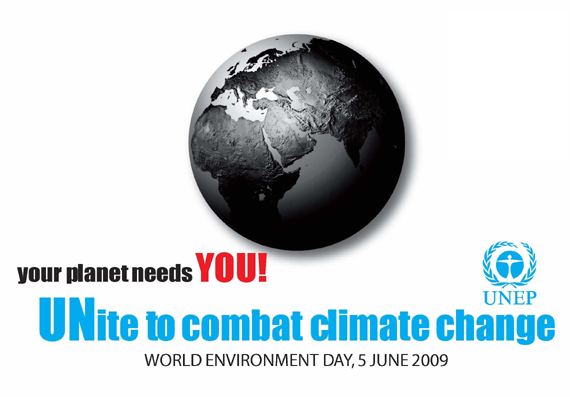 |
||
Here are some simple tips you can adhere to and make a difference to the environment: 1. By making simple lifestyle changes,- such as driving fewer miles or switching off unused electric appliances, we can combine to make a real difference. 2. Recharge Your Batteries – If you recharge your batteries, you will save money and help stop multiple environmental problems. You can prevent potentially hazardous metals from getting into landfills or the air, where they can be dangerous. So, buy rechargeable batteries and recharge them. 3. Recycle – It is essential that you start the recycling process at your own home. Sort out recyclable materials, which includes everything from plastic bottles to printer cartridges. Use paper bags. 4. Take Short Showers – If a family of four took 10-minute showers, they would use 1400 gallons of water every week. As a result, cutting down even a little bit can save a huge amount of water. 5. Use Fluorescent Lights – Fluorescent lights will last at least ten times as long as other light bulbs. In addition, they use only one-fourth as much energy, saving you money in the long run. 6. Use Reusable Goods – Everything that you throw away at home ends up in a landfill. Whenever you can, use reusable goods in place of disposable goods. For example, in the kitchen, use rags instead of paper towels. 7.Carpool – Driving releases a huge number of toxic chemicals into the air and damages the |
environment. If you can carpool, you will cut down on the amount of pollution that is created. 8. Get a Fuel-Efficient Car – Not only will a fuel-efficient car pollute less and use up less gas, it will save you money too. 9. Inflate Your tyres – By keeping your tyres inflated, you can prevent them from wearing out as fast and increase their lifetime. 10. Take the Bus – Taking public transportation helps to cut down on the number of vehicles on the road, reducing the amount of pollution that is created. 11. Avoid Products Using CFCs – Many wealthier nations have already banned CFCs, but some products around the world still contain them. CFCs are very dangerous for the environment because they destroy the ozone layer. 12. Buy a Low-Flush Toilet – By purchasing a low-flush toilet, you can save as much as one or two gallons on every flush. 13. Buy in Bulk – By purchasing large quantities of an item, you reduce the amount of packaging that you will need to throw away. 14. Purchase Recycled Products – On the labels of many products it will say if a product is made from recyclable materials. Many of them are, and buying these will help to cut down on waste. 15. Use Recyclable Bags – Plastic bags that are used by some grocery stores are not fully biodegradable. Instead, ask for paper bags, which can be reused and then recycled. Click here to visit the official site of UNEP. |
|
|
THE 11th HOUR |
||
The 11th Hour is a 2007 feature film documentary, created, produced and narrated by Leonardo DiCaprio, on the state of the natural environment. It was directed by Leila Conners Petersen and Nadia Conners. It was released about a year after Al Gore's An Inconvenient Truth. With contributions from over 50 politicians, scientists, and environmental activists, including former Soviet leader Mikhail Gorbachev, physicist Stephen Hawking, Nobel Prize winner Wangari Maathai, and journalist Paul Hawken, the film documents the grave problems facing the planet's life systems. Global warming, deforestation, mass species extinction, and depletion of the oceans' habitats are all addressed. The film's premise is that the future of humanity is in jeopardy. The film proposes potential solutions to these problems by calling for restorative action by the reshaping and rethinking of global human activity through technology, social responsibility and conservation. Scientists and environmental advocates |
such as David Orr, David Suzuki, Paul Stamets, and Gloria Flora paint a portrait for a radically new and different future in which it is not humanity's intent to dominate the planet's life systems, but to mimic and coexist with them.
Another film documentary about global warming after Al Gore's 'An Inconvenient Truth'. |
ll scientists agreed on the fact that global warming was an immediate threat. Every expert interviewed stressed the fact that human involvement in the fight against global warming is mandatory. This is due to the fact that the increased anthropogenic cycle is pinned down as the main cause of climate change in the movie. The role of humans in the destruction of the environment is explained from the viewpoint of several different professional fields: environmental scientists, oceanographers, economic historians, medical specialists, etc. The best example of this came from philosopher Wade Davis who theorized that to people, “You are either a person or property,” referring to mankind’s view on land and natural resource.
To visit the official site of the film, please click here. To visit the site of ‘An inconvenient truth’, please click here. |
|
|
|
| Editor's Note |
June 5 is the World Environment Day. The global climate is changing, and not just in the skies. Across the world, nations and people are uniting behind a common ideal, working with a newfound determination to safeguard a collective future. The future of this planet rests on human ingenuity, resolution and collaboration- and in conviction that we can make a difference. Combating climate change and preserving ecosystems services that underpin our economies is an issue for everyone. Every individual's efforts, no matter how small, can contribute to the sustainable development of our economies and communities around the world. On this occasion, let’s pledge to do at least one or two things consistently, be it a switching lights off or using solar cookers or by using vehicle for a day, every week. Let us Give promise, and Keep promise! If we are not part of the solution, then, by default, we are part of the problem. Let us give real contribution to the burning problem of this world. - Kshama Kataria
|
|
||||
Simple Resolutions |
||||
Water – I will... • Only fill the kettle with as much water as necessary for immediate use. . Waste – I will... • Use a recycling bin for all recyclable materials.
Energy – I will... • Install energy-saving light bulbs in my home.
Carbon Dioxide – I will... • Keep my vehicle tuned regularly; this will increase its fuel efficiency and reduce its CO2 production.
|
||||
| Alive Archives | ||||
To View Alive Archives, Please Click here>>> |
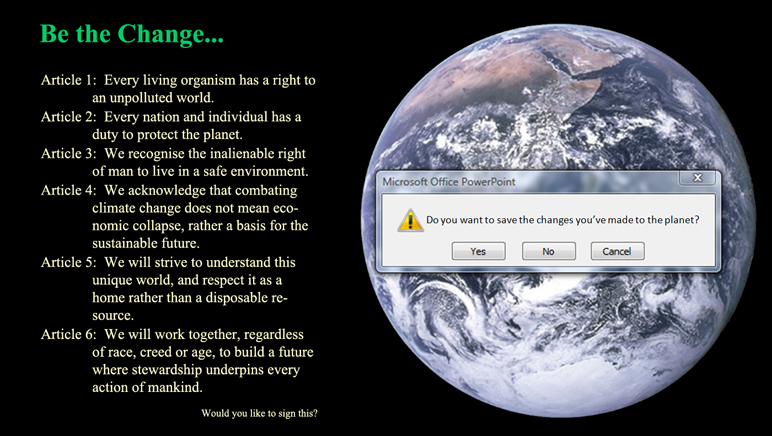 |
You
receive this newsletter because you may have registered your name
with us. |
© Copy Right by Oasis Self
Leadership Education for Community Development, Vadodara, Gujarat,
India. |
